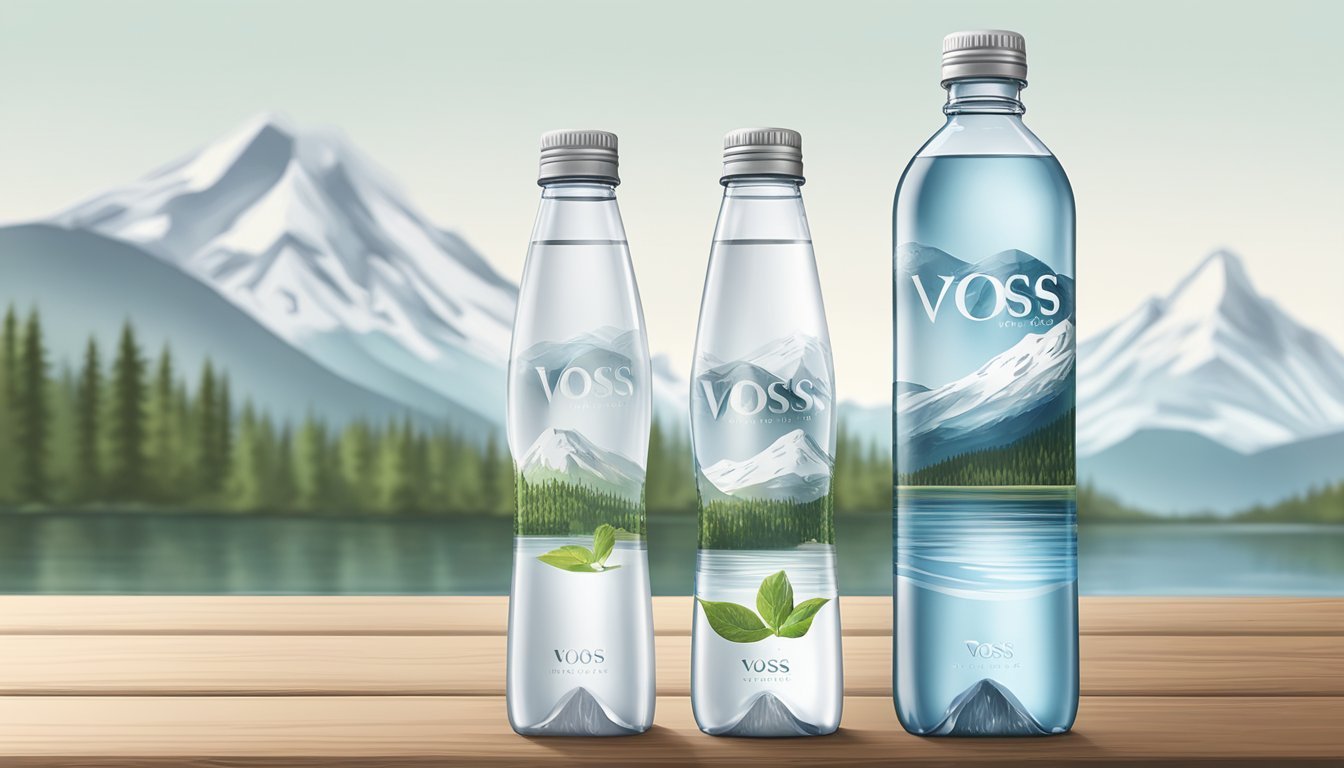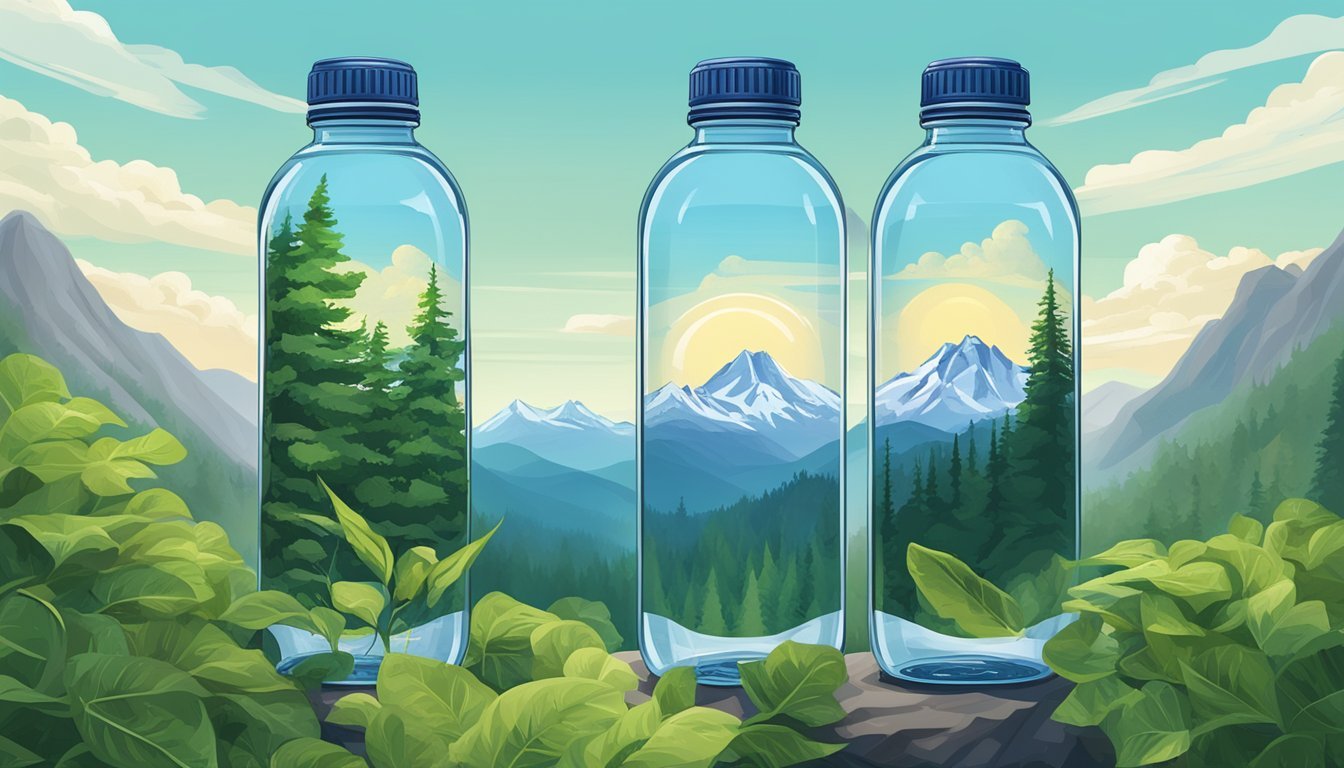Voss vs. Cascade Mountain
Which Bottled Water is Better for You?
Choosing between Voss and Cascade Mountain bottled water can be challenging for consumers seeking the best hydration experience. Voss, known for its Norwegian artesian origin, offers a crisp and clean taste profile. Its sleek, stylish bottle has become a cultural icon, appealing to consumers who prioritize aesthetics as well as quality.
Cascade Mountain, sourced from natural springs in the Pacific Northwest, provides a refreshing and pure drinking experience. The water is naturally filtered, ensuring a smooth and invigorating taste. This brand emphasizes sustainable practices and environmental responsibility, attracting eco-conscious buyers.
For those who value taste and sustainability in their bottled water, Cascade Mountain stands out as a superior choice. This blog post will compare Voss and Cascade Mountain in various aspects to help you decide which bottled water best suits your needs.
Understanding Bottled Water
Bottled water comes in many types and sources, each offering different health and hydration benefits. Consumers must also weigh the environmental impact and sustainability of bottled water choices.
Types and Sources of Bottled Water
Bottled water can be classified into different types based on its source and treatment methods. Natural spring water, such as Voss, is sourced from underground springs and usually has a distinct mineral profile. Artesian water comes from an aquifer, a natural underground reservoir, and is often acclaimed for its purity.
Purified water undergoes extensive filtration processes like reverse osmosis and microfiltration to remove impurities. This ensures a higher quality compared to ordinary tap water. The water source plays a crucial role in determining its mineral content, taste, and quality.
Health and Hydration Factors
Health benefits and hydration efficacy vary among different bottled water types. Natural spring waters and artesian waters naturally contain minerals and electrolytes. These contribute to electrolyte balance and overall hydration. For example, Voss water boasts a clean taste free from impurities, making it a preferred choice for hydration.
Purified water, while lacking natural minerals, ensures removal of contaminants. Water's pH level, such as Essentia’s 9.5 or higher, can influence its alkalinity and potential health benefits. However, consumers should be cautious of added substances like sodium or sweeteners in some brands.
Environmental Impact and Sustainability
The environmental impact of bottled water is significant, largely due to plastic waste from disposable bottles. Brands like Evian have started using bottles made from a percentage of recycled plastic, addressing some sustainability concerns. Reusable water bottles are a more sustainable option, reducing plastic pollution.
BPA-free plastic is another factor consumers should consider for health safety. Moving to more eco-friendly options and supporting brands with environmentally conscious practices helps mitigate the adverse effects of bottled water on the planet. Sustainability efforts by companies can make a considerable difference in reducing the industry's footprint.
Brand Profiles
This section provides detailed insights into the unique characteristics of Voss and Cascade Mountain bottled water, focusing on their design, source, and consumer appeal.
Voss: Sleek Glass and Pure Taste
Voss is known for its luxurious glass bottles and minimalistic design. Sourced from an artesian well in Norway, Voss offers a refreshing, pure taste that has gained popularity among consumers who value both substance and style.
Packaging: The sleek and cylindrical glass bottles not only look elegant but also help maintain the water's purity. This design has become a hallmark of the Voss brand.
Taste and Composition: Voss water is celebrated for its crisp, clean taste. The low mineral content contributes to its refreshing profile, making it a favorite among those who prefer a subtle flavor.
Market Positioning: Voss caters to the premium market segment, often found in upscale hotels, restaurants, and fitness centers. It positions itself as a lifestyle brand that goes beyond just hydration.
Cascade Mountain: Natural Elegance
Cascade Mountain, originating from Butte Falls, Oregon, emphasizes sustainability and purity. It is particularly appealing to eco-conscious consumers.
Source: This water is sourced from natural springs in Butte Falls, renowned for its high quality. The pristine environment ensures that the water is free from contaminants.
Sustainability: Cascade Mountain places a strong emphasis on environmental responsibility. The brand uses eco-friendly packaging and implements sustainable practices throughout its production process.
Taste and Benefits: The taste of Cascade Mountain water is often described as clean and invigorating, with a balanced mineral content that adds a subtle yet refreshing flavor.
Market Appeal: With a focus on natural elegance and sustainability, Cascade Mountain attracts consumers who are environmentally conscious and appreciate high-quality, natural products.
Comparing Taste and Purity
This comparison between Voss and Cascade Mountain bottled waters will examine their taste profiles, mineral content, health implications, and purification processes.
Water Taste Profiles
Voss water is often praised for its crisp, clean taste with a neutral pH balance that caters to those seeking a smooth drink without any aftertaste. Its taste is perfected by its journey through layers of ancient rock and sand in Norway, which naturally filters the water.
Cascade Mountain, sourced from the springs of the Cascade Range in the United States, has a distinctly light, slightly sweet taste. The water is noted for its subtle mineral notes which appeal to those who appreciate a hint of natural flavors.
Cascade Mountain's taste can be described as refreshing and slightly velvety due to its unique mineral profile.
Mineral Content and Health Implications
Voss contains a low mineral content, with minimal levels of calcium and magnesium, making it suitable for those looking for pure hydration without a strong mineral presence. The specific mineral breakdown includes low sodium and low total dissolved solids (TDS), contributing to its clean taste.
Cascade Mountain water, on the other hand, offers a richer mineral profile. It contains higher levels of calcium and magnesium, which are both essential nutrients for bone health and muscle function.
The presence of these minerals gives Cascade Mountain a slight edge in health benefits, especially for active individuals needing electrolyte replenishment.
Purification Processes
Voss water undergoes a meticulous filtration process before bottling. Despite its natural purity from rock and sand filtration, the water is subject to further treatment to ensure the highest quality. This involves multiple steps, ensuring that no impurities or unwanted substances remain.
Cascade Mountain water undergoes a rigorous purification process as well, starting at the source. The spring water is naturally filtered through volcanic rock, which adds beneficial minerals. Additional purification steps may include microfiltration and UV treatment to ensure safety and purity.
Both Voss and Cascade Mountain prioritize rigorous purification to maintain high standards of cleanliness and mineral balance. Each brand ensures that the water is free from contaminants while retaining its natural properties.
Health and Safety Considerations
When assessing the health and safety of bottled water options like Voss and Cascade Mountain, it's crucial to evaluate their acidity and alkalinity levels, as well as their susceptibility to contaminants and pollutants.
Acidity vs. Alkalinity
Both Voss and Cascade Mountain have pH levels that are important indicators of water quality.
Voss water has a pH level of around 6, making it slightly acidic. This level is safe for drinking but may be of concern to those with specific dietary restrictions or acid sensitivity.
Cascade Mountain water, by contrast, has a pH level closer to 7, making it neutral and possibly more appealing to those looking for a balanced pH in their drinking water.
Alkaline water proponents claim health benefits such as improved hydration and detoxification. However, these claims are not universally endorsed by health experts.
Contaminants and Pollutants
Regulated by the Environmental Protection Agency (EPA) in the United States, both Voss and Cascade Mountain must meet stringent standards for contaminants.
Voss is known for its pristine sources and rigorous filtration processes, ensuring minimal presence of pollutants. Its glass bottle options also reduce the risk of plastic contaminants.
Cascade Mountain also emphasizes its high-quality sourcing and contamination controls. Testing results show it is free from harmful substances like lead, arsenic, and bacteria.
Both brands aim to provide consumers with safe drinking water, though periodic testing and transparency about water quality reports are key to maintaining trust.
Environmental and Social Responsibility
Voss and Cascade Mountain bottled water brands put significant emphasis on their environmental and social responsibilities. This involves examining the impacts of their production processes and the sustainable practices they adopt to reduce the environmental impact.
The Impact of Bottled Water Production
Bottled water production has several environmental challenges. It requires significant amounts of plastic, transporting the bottles has a considerable carbon footprint, and the disposal of bottles contributes to landfill waste.
Voss is known for its use of reusable glass bottles and recyclable plastic options. These choices help reduce plastic waste. Cascade Mountain also acknowledges the environmental impact, sourcing water responsibly and using recyclable materials.
Both companies are focused on minimizing their ecological footprints through sustainable water management and efficient logistics.
Sustainable Practices and Consumer Choices
Consumers are increasingly considering sustainability when choosing bottled water. Voss’s glass bottles are reusable, and they offer recyclable plastic alternatives, making it a popular choice for eco-conscious drinkers.
Cascade Mountain emphasizes using renewable resources in their packaging. They advocate for environmentally friendly practices throughout their production chain.
Water drinkers play an essential role by preferring brands that prioritize sustainability. Their decisions can drive the best bottled water companies to adopt more eco-friendly and socially responsible practices.
Consumer Considerations
Customers looking at Voss and Cascade Mountain bottled water often evaluate factors such as cost, accessibility, packaging, and brand image. These elements play crucial roles in guiding purchasing decisions and customer satisfaction.
Cost and Accessibility
Voss is generally considered a premium bottled water brand, often found in high-end grocery stores and restaurants. Its sleek glass bottle and origins from Southern Norway contribute to its higher price point.
Cascade Mountain, marketed as a more accessible option, offers competitive pricing. It can often be found at retailers like Costco, making it a convenient choice for bulk purchases.
While both brands have their appeal, Voss may be seen as a fancy indulgence, while Cascade Mountain serves as a practical, everyday option.
Packaging and Brand Image
Voss is renowned for its iconic glass bottle design, which has become a symbol of luxury and sophistication. Its packaging is often cited as a primary reason for its higher price. This sleek and elegant bottle not only looks good but also signifies a premium product.
Cascade Mountain, on the other hand, opts for simpler, more functional packaging. While it may lack the high-end aesthetics of Voss, its practical design appeals to a different set of consumers who prioritize functionality over looks.
In terms of branding, Voss invests significantly in portraying an image of exclusivity. Cascade Mountain focuses on being an accessible and reliable choice for everyday hydration.
The Final Verdict
When comparing Voss Water to Cascade Mountain, specifics matter.
Voss Water originates from Southern Norway. It is known for its clean and refreshing taste, making it a preferred choice among many. The sleek, cylindrical bottle design adds to its premium appeal.
On the other hand, Cascade Mountain is sourced from pristine springs in the Pacific Northwest. This water is highly praised for its natural, crisp flavor. Additionally, Cascade Mountain's emphasis on eco-friendly packaging sets it apart in sustainability.
In terms of pH levels, Voss maintains a balanced pH, which can be ideal for those seeking neutral water. For those prioritizing mineral content and natural sourcing, Cascade Mountain stands strong.
Key Points:
Voss Water:
Origin: Southern Norway
Known for: Clean, refreshing taste
pH Level: Balanced
Packaging: Sleek, cylindrical design
Cascade Mountain:
Origin: Pacific Northwest
Known for: Crisp, natural flavor
pH Level: Slightly alkaline
Packaging: Eco-friendly
Bottom Line: Consumers seeking a luxurious, stylish option may lean towards Voss Water for its aesthetics and refreshing quality. Those who prioritize natural taste and sustainability may find Cascade Mountain to be the better bottled water choice.
Signal: Both waters offer excellent qualities and the best bottled water ultimately depends on individual preference and priorities.
More About Voss
More About Cascade Mountain
Acqua Pana vs Cascade Mountain: Which Bottled Water is Better?
Antipodes vs Cascade Mountain: Which Bottled Water is Better?
Aqua Carpatica vs Cascade Mountain: Which Bottled Water is Better?
Aquafina vs Cascade Mountain: Which Bottled Water is Better?
Arrowhead vs Cascade Mountain: Which Bottled Water is Better?
Boxed Water vs Cascade Mountain: Which Bottled Water is Better?
Cascade Mountain vs 1907water: Which Bottled Water is Better?
Cascade Mountain vs 7-Select: Which Bottled Water is Better?
Cascade Mountain vs Alkaline88: Which Bottled Water is Better?
Cascade Mountain vs Big Chill: Which Bottled Water is Better?
Cascade Mountain vs BodyArmor: Which Bottled Water is Better?
Cascade Mountain vs CBD Living: Which Bottled Water is Better?
Cascade Mountain vs Crystal Geyser: Which Bottled Water is Better?
Cascade Mountain vs Crystal Lake: Which Bottled Water is Better?
Cascade Mountain vs Essence pH10: Which Bottled Water is Better?
Cascade Mountain vs Kirkland Signature: Which Bottled Water is Better?
Cascade Mountain vs Open Water: Which Bottled Water is Better?
Cascade Mountain vs Proud Source: Which Bottled Water is Better?
Cascade Mountain vs Pure Life: Which Bottled Water is Better?
Cascade Mountain vs Refreshe: Which Bottled Water is Better?
Cascade Mountain vs Richard's Rainwater: Which Bottled Water is Better?
Cascade Mountain vs Simple Truth: Which Bottled Water is Better?
Cascade Mountain vs Talking Rain AQA: Which Bottled Water is Better?
Cascade Mountain vs The Well: Which Bottled Water is Better?
Cascade Mountain vs Weird Water: Which Bottled Water is Better?
Cascade Mountain vs Whole Foods 365: Which Bottled Water is Better?
Castle Rock vs Cascade Mountain: Which Bottled Water is Better?
Core Hydration vs Cascade Mountain: Which Bottled Water is Better?
Deer Park vs Cascade Mountain: Which Bottled Water is Better?
Essentia vs Cascade Mountain: Which Bottled Water is Better?
Hawaii Volcanic vs Cascade Mountain: Which Bottled Water is Better?
Hawaiian Springs vs Cascade Mountain: Which Bottled Water is Better?
Ice Mountain vs Cascade Mountain: Which Bottled Water is Better?
Icelandic Glacial vs Cascade Mountain: Which Bottled Water is Better?
Just Water vs Cascade Mountain: Which Bottled Water is Better?
Liquid Death vs Cascade Mountain: Which Bottled Water is Better?
Mananalu vs Cascade Mountain: Which Bottled Water is Better?
Mountain Valley Spring Water vs Cascade Mountain: Which Bottled Water is Better?
Nestle Pure Life vs Cascade Mountain: Which Bottled Water is Better?
Poland Spring vs Cascade Mountain: Which Bottled Water is Better?
Purely Sedona vs Cascade Mountain: Which Bottled Water is Better?
San Pellegrino vs Cascade Mountain: Which Bottled Water is Better?
Smartwater vs Cascade Mountain: Which Bottled Water is Better?
Solan de Cabras vs Cascade Mountain: Which Bottled Water is Better?
Topo Chico vs Cascade Mountain: Which Bottled Water is Better?
Tru Alka vs Cascade Mountain: Which Bottled Water is Better?
Whole Foods Italian Still Mineral water vs Cascade Mountain: Which Bottled Water is Better?
Zephyrhills vs Cascade Mountain: Which Bottled Water is Better?







